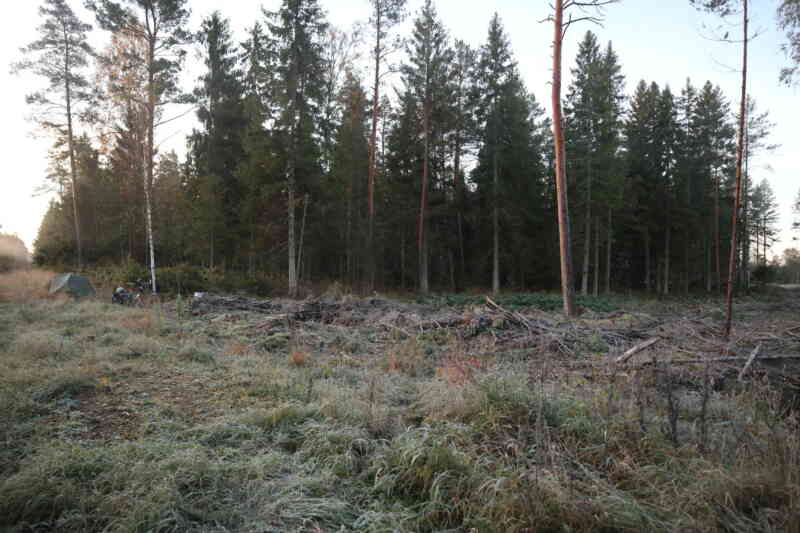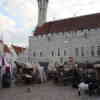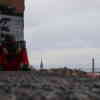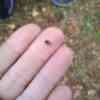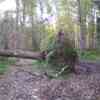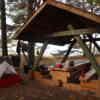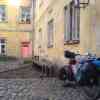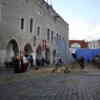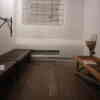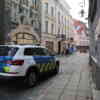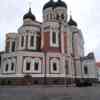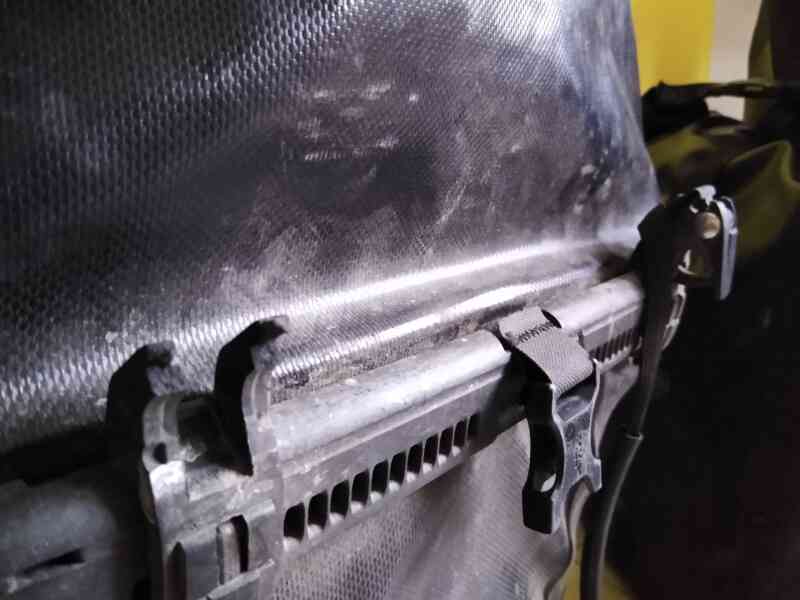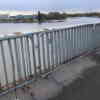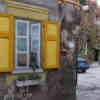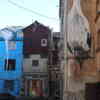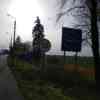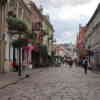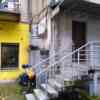Entering the Baltics, or more precisely: leaving Scandinavia is a pivotal moment in regards to my comfort: Finally, a hotel/hostel stay is within my financial means again!
That doesn't mean that I will forgo wild camping from now on. I just like it too much!
While the ride through the Baltics has only little to offer scenery-wise, it will be here where I make one of my most memorable wildlife encounters ...
Camping in the forest
Just like in Scandinavia, the wild camping rules in Estonia and the other Baltic states are fairly relaxed, and while I generally never pitch in plain sight of settlements or next to trafficed roads, I do like to camp on the edge of or in forests.
To me the biggest advantage of forests in the winter is they provide some protection against wind or rain, and a higher temperature at night.
The biggest disadvantage: they don't let sunlight in, so it's more difficult to warm up in the morning, dry the tent etc. And: sometimes, there's animals.
Meeting the Estonian wolf
The time is running out though. It gets dark early these days in October, and I should get my cooking started if I don't want to cook and eat in the dark.
But What's that? Just minutes after having I've pitched up the tent I hear a howling sound. And it's not the wind! Three, four, maybe more different voices. And not far away either, probably just 1 km, maybe less.
A few minutes later I have decided: Unlike in India, I will not retreat this time. And I will have meat balls for dinner, no matter What!
Meanwhile, it has gotten dark and the only way to see What I'm doing on the fire is by using my headlamp. Normally I would just use it in low-power mode with a red light (which is easier on the eyes), however given the circumstances I'm going for white light and maximum brightness tonight, occasionally panning away from my pot and checking the surroundings.
And sure enough, I soon see 2 bright dots in the dark: a pair of eyes reflecting the light, a mere 60 m or so away ...
Within the last years I've had my fair share of wild dogs, deer, foxes and other small mammals checking out my camp site. But it is clear that this one is of a different breed.
First of all, it's much taller than a fox, but just as nosy! After some quiet observation, the creature starts slowly wandering towards me. Maybe ... I ... should be worried after all?
When the animal is maybe 20-30 m from me, it stops. I can see its eyes moving up as it raises its nose to sniff. My light is barely strong enough but I can recognize it's rough shape. One thing is clear: that is a wolf.
And then, after having sniffed me out from the distance, it turns around and without any sign of rush, trots away.
Unfortunately I didn't get to take any pictures, but if you watch that scene from the Kevin Costner movie "Dances with Wolves" where Lt. Dunbar chases the wolf... it was kind of like that ;P
More Estonia photos
And already in Latvia
Uaaah. Just as am in the middle of Riga, my bag gets caught at a corner of a building and before I even realize it the bags plastic hook fails and the bag is merely dangling on the side. And that just 1 km from my hotel!
I ask a Warmshowers member for help. He advises me to seek out a local store which is, lucky me, just 500 m from my hotel. And it's even open on Sundays! Lucky me, again. Less than 24 hours later my bag is as good as new (well not quite, the outer Mesh pocket is also torn, but that's more a cosmetic issue). Probably the best place in the Baltics for this to happen!
More photos from Latvia
Lithuania
Entering Lithuania I had been worried again about travel restrictions, but despite compulsory online registration nobody.
I won't be visiting the capital Vilnius since it's too far off my route. Kaunas however is on the way and local Audrius takes some time to show me around.
Like in the other Baltic cities I've been staying in hostels here, too. The lack of travelers in Corona-times often means I get a dormitory for myself, or individual rooms are much more affordable than usual.
On the other hand, many businesses like hostels are struggling now and have to resort to other means to earn money, such as hosting non-touristic residents such as temporary workers in their rooms and dormitories.
